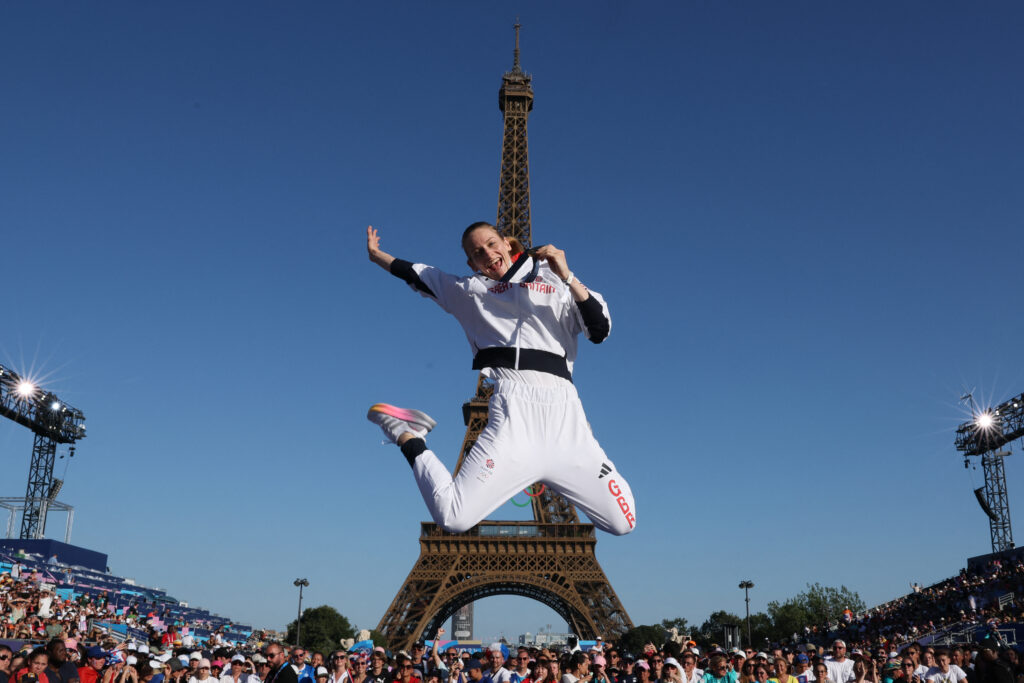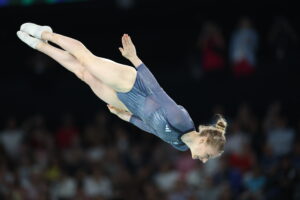Bryony Page - a golden success story many years in the making
Representing your country at the Olympic or Paralympic Games is one of the biggest achievements in high-performance sport, but what sometimes goes unnoticed is the tireless work athletes and their support teams put in to get there. It takes many years of preparation, which can involve navigating highs, lows, injuries and sacrifices along the way.
Bryony Page became the Olympic trampoline champion at Paris 2024, GB’s first female Olympic champion in a gymnastics discipline. The 33-year-old was also the first British trampolinist to win an Olympic medal, when she won silver at Rio 2016, following that up with bronze at Tokyo 2020.
In addition to Bryony’s own hard work and talent, the success in Paris was the result of meticulous performance planning, cohesive teamwork, and strategic strength and conditioning (S&C), that made up a process known as ‘What It Takes to Win (WITTW)’.
Driven by the British Gymnastics National Coaching Team in collaboration with UKSI practitioners, this process was instrumental in identifying the physical, mental and technical areas that needed refinement in order for Bryony to achieve gold.
Head National Coach Gary Short explained: “The insights gained through WITTW guided our targeted approach throughout the entire cycle. Monthly Performance Planning meetings, alongside individual multidisciplinary team discussions, were foundational to our collective approach. These meetings were far from routine; they were crucial touchpoints for aligning the entire support team, allowing us to make timely adjustments based on Bryony’s feedback and performance data.
“This level of continuous monitoring and collaboration was essential in fine-tuning her preparation and ultimately paving the way for her historic achievement.”

A key member of that support team was Ben Young, Strength and Conditioning Coach at the UKSI and British Gymnastics, who has been leading Bryony’s S&C for four years.
Alongside Gary and Senior S&C coach Ruddy Farquharson, Ben worked on a plan to ensure Bryony was in peak physical shape in Paris, which became particularly significant when she encountered some challenges mid-cycle:
“It was a really busy cycle for Bryony, so we decided to put her on a big taper after she secured Olympic qualification – this was for six weeks and involved maintenance sessions before we went into Olympic preparation camps – this meant Bryony had a significant period of detraining, so we had to put her through an intensive training block during Spring 2024.
“We decided to focus all aspects of her preparation on being able to perform on the trampoline, instead of risking overtraining. The feedback from her coach was that if she was able to be on the trampoline, she would perform and could win a medal.”
“After Tokyo 2020, we did some tests with Bryony to understand what a bronze medal performance looked like. That testing underpinned a lot of our strategies around Trampolining during the Paris Cycle.
“This research created trust in the refined S&C plan for Bryony. She believed in the exercise process – we knew it wouldn’t cause injuries – she had done all the exercises before – we had historical data to back that up – there were a lot of things to give both of us confidence in what we were doing.”

Having worked so closely with Bryony in the build-up to the Games, Ben was lucky enough to be in Paris alongside other members of her support team to watch her compete.
“I’m not a very good spectator and get very nervous! It was special to watch Izzy Songhurst compete at her first Olympics, and great to see Bryony competing after the work we put in before Paris.”
Bryony made the final after some good performances and was drawn seventh. As the scores from her competitors came in, optimism was growing.
“We knew her routine would outperform them if everything clicked – Bryony delivered and we knew she would be guaranteed at least a silver, but the emotion when we found out she had won gold was incredible – there were plenty of tears!
“It felt like it took things to another level in terms of sport awareness, which is great. It was a pleasure to have witnessed it. Behind my marriage and my children being born, it was the best occasion of my life and a professional highlight.”
Ben said it felt ‘amazing’ to know that he had played a part in Bryony’s success and credits the education he has received during his years at the UKSI in helping him. However, it was the desire of the whole performance support team to collaborate that Ben has really taken from this experience.
“The key for me is collaboration, as a lot of UKSI people helped ensure Bryony could get the Games. We realised that having conversations with Bryony and the coaches was more valuable than trying to hit objective numbers through S&C exercises. Having those conversations and ensuring everyone was involved in the process was powerful. The one-team approach contributed to the success of this story.”
Gary was in full agreement: “Bryony’s triumph at the Paris 2024 Olympics stands as a testament to the power of strategic planning, teamwork, and adaptive coaching. Each element of our approach, from the WITTW process to detailed performance monitoring, was integral to creating an environment that not only supported her athletic goals but also celebrated her extraordinary journey to Olympic glory.”
A multiple European, World and now the Olympic champion, Bryony reflected on the team around her and the impact they have had on her life.
She said: “My support team within the UKSI has had a huge positive impact on my sporting career and the way I approach my life outside of sport too.
“Being able to work with a team of experts in many different fields across sport – S&C, Psychology, Nutrition, Physiotherapy, Performance Analysis, Performance Lifestyle – has allowed me to get the best possible performance plan constructed that is world class and tailored to my personality, my preferences and my needs in the pursuit to achieve specific goals.
“Their approach is collaborative, which is hugely beneficial. When ideas are shared and formed, anything that overlaps or could be improved is highlighted. The team work well with each other from the UKSI, as well as with myself and my external team at my home training base.
“The performance planning is not just focused on trampolining but is looked at holistically for the person, so a balanced lifestyle, values and professional growth is included. I have learnt so much from the team and their support has been monumental to my progression and achievements within sport and life.”